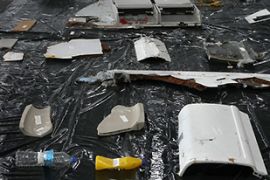Bodies found in crash site now 50
Search continues despite worsening weather and no sign of Air France jet’s “black box”.

“The debris will be at the disposition of the BEA and they will decide what to do with it,” General Ramon Cardoso, of the Brazilian air force, said.
He said French ships equipped with sonar were looking for underwater
wreckage over an area stretching 70km from the last known position of the airliner.
Best hope
The Air France Flight 44’s “black box” of data recorders – the best hope of establishing how and why it went down en route from Rio de Janeiro to Paris – still has not been found.
The clues that have been found so far lead investigators to believe there were systemic failures on board the Airbus A330-200.
| In depth |
|
Videos: |
A burst of 24 automatic messages sent during its final minutes of flight show the autopilot was not on.
But it was not clear if it was switched off by the pilots or
stopped working due to conflicting airspeed readings, perhaps caused by iced-over speed sensors.
As search teams continue to operate in worsening weather, Brazil’s military said the task is becoming increasingly difficult and a tentative date of June 25 has been set for stopping recovery efforts.
Beginning on Monday, officials will meet every two days to evaluate when to stop the search, depending on whether search teams are still finding bodies or debris.
William Waldock, a teacher of air crash investigation at Embry-Riddle Aeronautical University in Prescott, Arizona, USA, said the ability for a body to float in water and remain visible to searchers depends highly on water temperatures and sea life in the area.
Warm water speeds up the process of a body surfacing, floating and then sinking again, he said.
According to the Brazilian military, the water temperature in the areas they are looking is averaging about 82 degrees (28 degrees Celsius).
Those warm waters also mean there is a lot of marine life in the area and “they’ll break a body down faster”, Waldock said.

 Union wants faulty gauges replaced
Union wants faulty gauges replaced